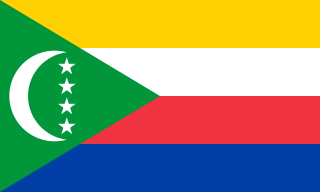 |
|---|
|
Realising Freedom's Capability, also known as Uwezo (Leadership), was a political party in the Comoros.
 |
|---|
|
Realising Freedom's Capability, also known as Uwezo (Leadership), was a political party in the Comoros.
The party was established in Paris by former Foreign Minister Mouzawar Abdallah in 1984 as the Union for a Democratic Republic in the Comoros (Union pour une République Démocratique aux Comores, URDC). [1] In 1990 it was reorganised as UWEZO. [1] The party was part of the "no" camp for the 1992 constitutional referendum. [2] It won a single seat in the 1992 parliamentary elections, [3] and retained it in early elections the following year.
The party nominated Mouzawar as its candidate for the 1996 presidential elections. Abdallah failed to make the second round. Later in 1996 it was one of several parties that merged to form the National Rally for Development. [4]

The Comoros, officially the Union of the Comoros, is an archipelagic country made up of three islands in Southeastern Africa, located at the northern end of the Mozambique Channel in the Indian Ocean. Its capital and largest city is Moroni. The religion of the majority of the population, and the official state religion, is Sunni Islam. Comoros proclaimed its independence from France on 6 July 1975. The Comoros is the only country of the Arab League which is entirely in the Southern Hemisphere. It is a member state of the African Union, the Organisation internationale de la Francophonie, the Organisation of Islamic Co-operation, and the Indian Ocean Commission. The country has three official languages: Shikomori, French and Arabic.
The history of the Comoros extends back to about 800–1000 AD when the archipelago was first inhabited. The Comoros have been inhabited by various groups and sultanates throughout this time. France colonised the islands in the 19th century, and they became independent in 1975.

The Politics of the Union of the Comoros take place in a framework of a unitary presidential republic, whereby the President of the Comoros is both head of state and head of government, and of a multi-party system. Executive power is exercised by the government. Legislative power is vested in both the government and parliament. The precolonial legacies of the sultanates linger while the political situation in Comoros has been extremely fluid since the country's independence in 1975, subject to the volatility of coups and political insurrection.
Ahmed Abdallah Abderemane was a top Comorian politician. He was a member of the French Senate from 1959 to 1973, and President of the Comoros from 25 October 1978 until his assassination in 1989.

Elections in the Comoros take place within the framework of a multi-party democracy and a presidential system. The President and the majority of the seats in the Assembly of the Union are directly elected.
Domoni is the second largest city on the Comorian island of Anjouan in the Indian Ocean and is located on the east coast of the island. It was the capital of the island in the past while the present capital of Anjouan is Mutsamudu.
The Comorian Union for Progress is a political party in the Comoros.

The Comoros is an island nation in the Indian Ocean, located off the eastern coast of Africa. France first established colonial rule in the Comoros in 1841. Agreement was reached with France in 1973 for the Comoros to become independent in 1978. On 6 July 1975, but the Comorian parliament passed a unilateral resolution declaring independence. The deputies of Mayotte, which remained under French control, abstained. Referendums on all four of the islands excluding Mayotte showed strong support for independence. Ahmed Abdallah proclaimed the Comoros' independence on 5 September 1975 and became its first president.

Parliamentary elections were held in the Comoros on 6 December 2009, with a second round on 20 December. The elections were originally scheduled for July 2009, but were postponed until after a constitutional referendum was held in May 2009. They were then scheduled to take place on 29 November, but were delayed again. The result was a victory for the Baobab Movement, a coalition supporting President Ahmed Abdallah Mohamed Sambi.

A constitutional referendum was held in the Comoros on 17 May 2009. The constitutional amendments were approved with 93.9% in favour, with a turnout of 51.8%.

The National Rally for Development was a political party in the Comoros.

Maecha Bora was a political party in the Comoros.

The Rally for Change and Democracy was a political party in the Comoros led by Said Hassane Said Hachim.

Dialogue Proposition Action (DPA-Mwangaza) was a political party in the Comoros led by Mohamed Saïd Abdallah Mchangama.

The Rally for Democracy and Renewal is a political party in the Comoros.

The Movement for Renewal and Democratic Action was a political party in the Comoros.

Nguzo was a political party in the Comoros.

The Constitution of the Comoros was adopted on 23 December 2001 and last amended in May 2009.

Parliamentary elections were held in the Comoros on 19 January 2020; in constituencies where no candidate received a majority, a second round was held alongside local elections on 23 February. The elections were boycotted by the main opposition parties, including the two largest parties in the outgoing Assembly, the Union for the Development of the Comoros and Juwa Party, in protest at constitutional reform and political repression, The result was a landslide victory for President Azali Assoumani's Convention for the Renewal of the Comoros, which won 20 of the 24 elected seats.

Mouzawar Abdallah was a Comorian politician.